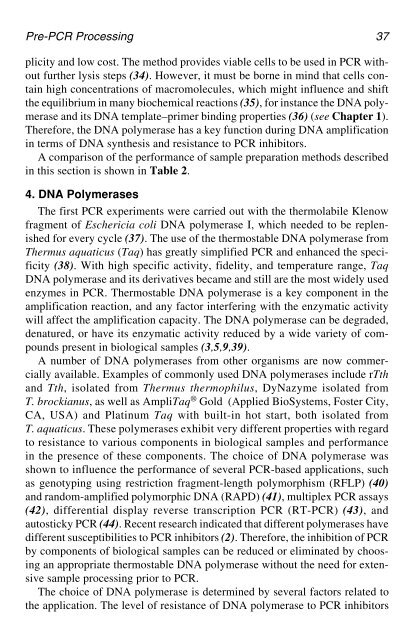PCR Detection of Microbial Pathogens PCR Detection of Microbial ...
PCR Detection of Microbial Pathogens PCR Detection of Microbial ...
PCR Detection of Microbial Pathogens PCR Detection of Microbial ...
You also want an ePaper? Increase the reach of your titles
YUMPU automatically turns print PDFs into web optimized ePapers that Google loves.
Pre-<strong>PCR</strong> Processing 37<br />
plicity and low cost. The method provides viable cells to be used in <strong>PCR</strong> without<br />
further lysis steps (34). However, it must be borne in mind that cells contain<br />
high concentrations <strong>of</strong> macromolecules, which might influence and shift<br />
the equilibrium in many biochemical reactions (35), for instance the DNA polymerase<br />
and its DNA template–primer binding properties (36) (see Chapter 1).<br />
Therefore, the DNA polymerase has a key function during DNA amplification<br />
in terms <strong>of</strong> DNA synthesis and resistance to <strong>PCR</strong> inhibitors.<br />
A comparison <strong>of</strong> the performance <strong>of</strong> sample preparation methods described<br />
in this section is shown in Table 2.<br />
4. DNA Polymerases<br />
The first <strong>PCR</strong> experiments were carried out with the thermolabile Klenow<br />
fragment <strong>of</strong> Eschericia coli DNA polymerase I, which needed to be replenished<br />
for every cycle (37). The use <strong>of</strong> the thermostable DNA polymerase from<br />
Thermus aquaticus (Taq) has greatly simplified <strong>PCR</strong> and enhanced the specificity<br />
(38). With high specific activity, fidelity, and temperature range, Taq<br />
DNA polymerase and its derivatives became and still are the most widely used<br />
enzymes in <strong>PCR</strong>. Thermostable DNA polymerase is a key component in the<br />
amplification reaction, and any factor interfering with the enzymatic activity<br />
will affect the amplification capacity. The DNA polymerase can be degraded,<br />
denatured, or have its enzymatic activity reduced by a wide variety <strong>of</strong> compounds<br />
present in biological samples (3,5,9,39).<br />
A number <strong>of</strong> DNA polymerases from other organisms are now commercially<br />
available. Examples <strong>of</strong> commonly used DNA polymerases include rTth<br />
and Tth, isolated from Thermus thermophilus, DyNazyme isolated from<br />
T. brockianus, as well as AmpliTaq ® Gold (Applied BioSystems, Foster City,<br />
CA, USA) and Platinum Taq with built-in hot start, both isolated from<br />
T. aquaticus. These polymerases exhibit very different properties with regard<br />
to resistance to various components in biological samples and performance<br />
in the presence <strong>of</strong> these components. The choice <strong>of</strong> DNA polymerase was<br />
shown to influence the performance <strong>of</strong> several <strong>PCR</strong>-based applications, such<br />
as genotyping using restriction fragment-length polymorphism (RFLP) (40)<br />
and random-amplified polymorphic DNA (RAPD) (41), multiplex <strong>PCR</strong> assays<br />
(42), differential display reverse transcription <strong>PCR</strong> (RT-<strong>PCR</strong>) (43), and<br />
autosticky <strong>PCR</strong> (44). Recent research indicated that different polymerases have<br />
different susceptibilities to <strong>PCR</strong> inhibitors (2). Therefore, the inhibition <strong>of</strong> <strong>PCR</strong><br />
by components <strong>of</strong> biological samples can be reduced or eliminated by choosing<br />
an appropriate thermostable DNA polymerase without the need for extensive<br />
sample processing prior to <strong>PCR</strong>.<br />
The choice <strong>of</strong> DNA polymerase is determined by several factors related to<br />
the application. The level <strong>of</strong> resistance <strong>of</strong> DNA polymerase to <strong>PCR</strong> inhibitors






